Johnson R.S. A Modern Introduction to the Mathematical Theory of Water Waves
Подождите немного. Документ загружается.

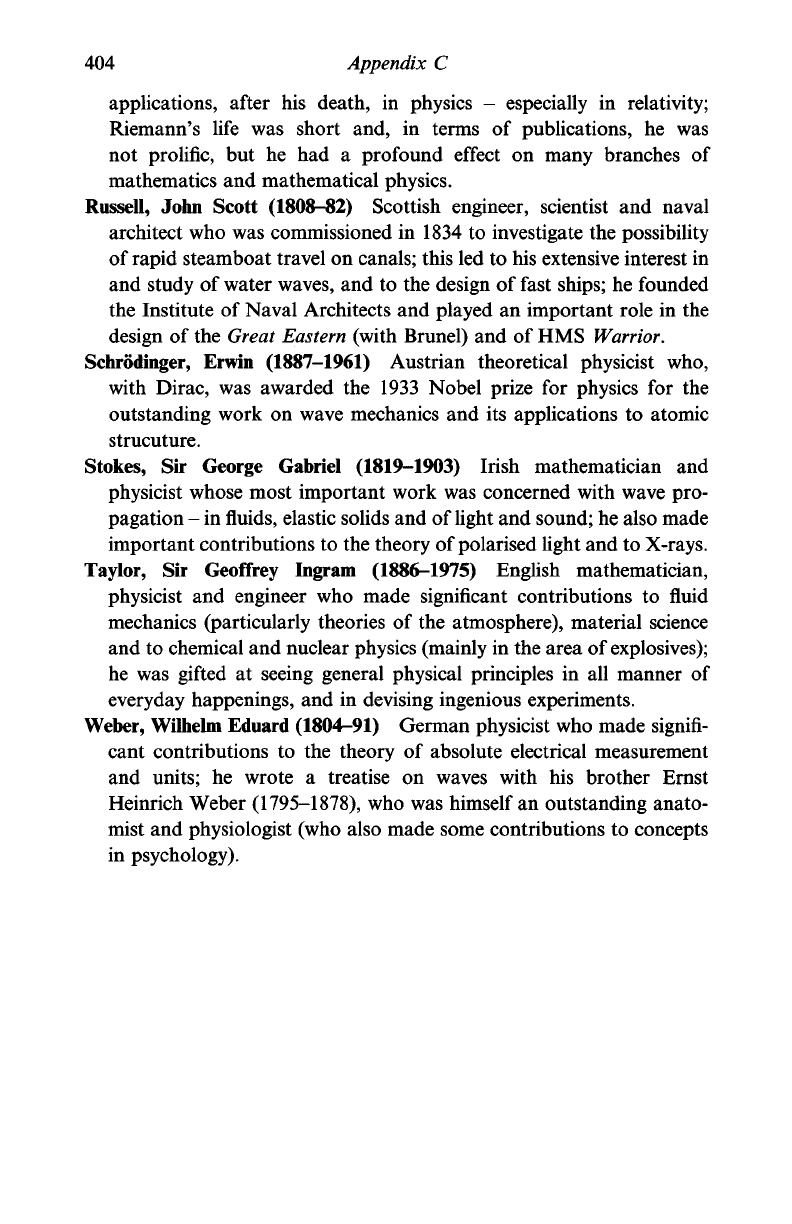
404 Appendix C
applications, after his death, in physics - especially in relativity;
Riemann's life was short and, in terms of publications, he was
not prolific, but he had a profound effect on many branches of
mathematics and mathematical physics.
Russell, John Scott (1808-82) Scottish engineer, scientist and naval
architect who was commissioned in 1834 to investigate the possibility
of rapid steamboat travel on canals; this led to his extensive interest in
and study of water waves, and to the design of fast ships; he founded
the Institute of Naval Architects and played an important role in the
design of the
Great Eastern
(with Brunei) and of HMS Warrior.
Schrodinger, Erwin (1887-1961) Austrian theoretical physicist who,
with Dirac, was awarded the 1933 Nobel prize for physics for the
outstanding work on wave mechanics and its applications to atomic
strucuture.
Stokes, Sir George Gabriel (1819-1903) Irish mathematician and
physicist whose most important work was concerned with wave pro-
pagation - in
fluids,
elastic solids and of light and sound; he also made
important contributions to the theory of polarised light and to X-rays.
Taylor, Sir Geoffrey Ingram (1886-1975) English mathematician,
physicist and engineer who made significant contributions to fluid
mechanics (particularly theories of the atmosphere), material science
and to chemical and nuclear physics (mainly in the area of explosives);
he was gifted at seeing general physical principles in all manner of
everyday happenings, and in devising ingenious experiments.
Weber, Wilhelm Eduard (1804-91) German physicist who made signifi-
cant contributions to the theory of absolute electrical measurement
and units; he wrote a treatise on waves with his brother Ernst
Heinrich Weber (1795-1878), who was himself an outstanding anato-
mist and physiologist (who also made some contributions to concepts
in psychology).
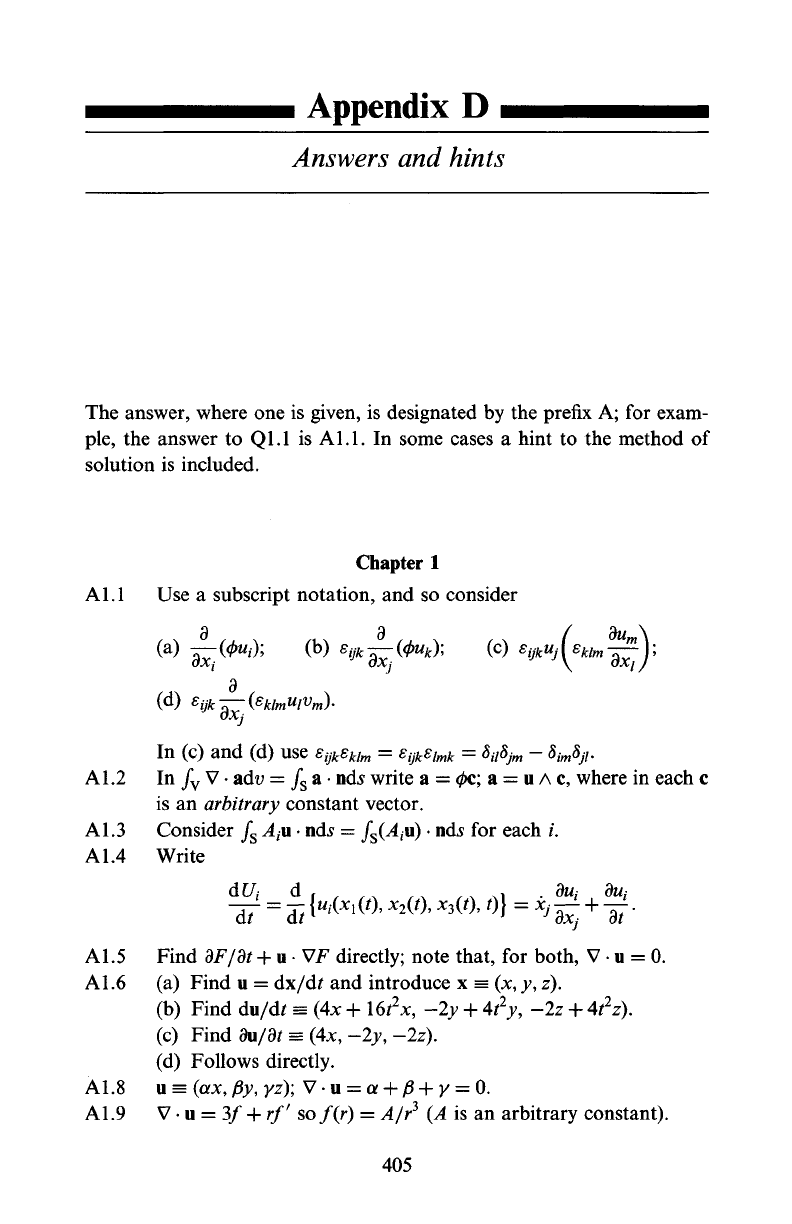
Appendix D
Answers and hints
The answer, where one is given, is designated by the prefix A; for exam-
ple,
the answer to Q 1.1 is ALL In some cases a hint to the method of
solution is included.
Chapter 1
A 1.1 Use a subscript notation, and so consider
(c)
E
(a)
(d)
a
OXf
s
ijk
(0u
z
-);
(b)
£i
9
aXj
In (c) and (d) use e
ijk
e
klm
= e
ijk
s
lmk
=
8
u
8
jm
-
8
im
8
jh
A1.2 In /
v
V •
adv = f
s
a
•
nds write a = 0c; a = u
A
C,
where in each c
is an
arbitrary
constant vector.
A1.3 Consider /
s
A
t
u
•
nds = /
s
G4;u)
•
nds for each /.
A1.4 Write
A1.5 Find dF/dt + u
•
VF directly; note that, for both, V
•
u = 0.
A1.6 (a) Find u = dx/dt and introduce x
==
(x,
y, z).
(b) Find du/dt =
{Ax
+ \6t
2
x, -2y
4-
4t
2
y, -2z -f
4t
2
z).
(c) Find du/dt = (4x, -2y, -2z).
(d) Follows directly.
A1.8 u = (ax, #y, yz);
V •
u = a + fi + y = 0.
A1.9
V •
u = 3/ + r/
r
so/(r) = A/r
3
(A is an arbitrary constant).
405
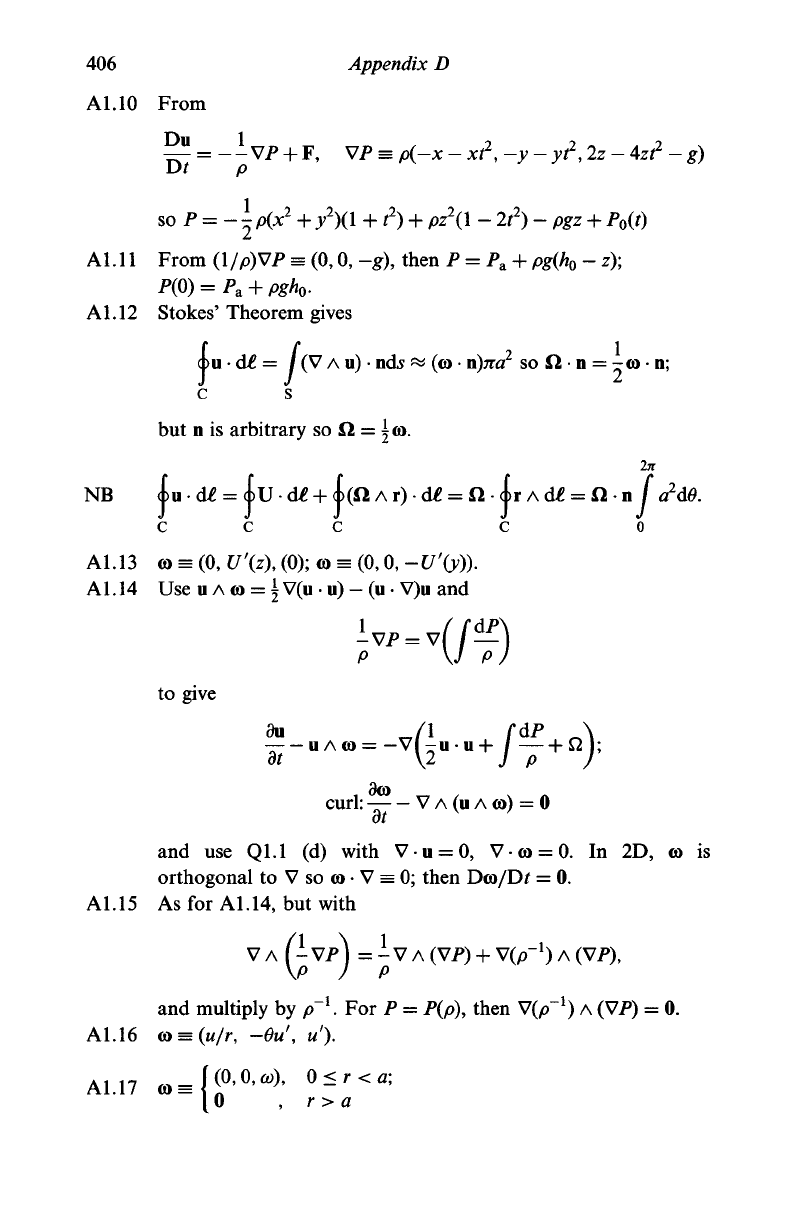
406 Appendix
D
A1.10 From
^
VP =
p(-
x
-xt\-y-yt\2z-4zt
2
-g)
Dt p
so
P =
-
X
-
p(x
2
+ /)(1
+
t
2
)
+ pz\\ - It
2
) -
pgz + P
0
(t)
Al.ll From (l/p)VP
=
(0, 0,
-g),
then
P
= />
a
+
Pg(h
0
-
z);
P(0)
=
P
a
+ pgh
0
.
A 1.12 Stokes' Theorem gives
cpu
•
d£
=
I (V A u)
•
nds
«
(co
•
n)jta
2
so 11
n =
-co
•
n;
c
s
but
n
is arbitrary so
ft =
^(o.
In
NB lu
•
d£ = <j)U
•
d£
+
<j)(ft
A
r)
•
d£ =
ft
•
Ir
A
d£ =
ft
•
n
f
a
2
d0.
c
c c c
A1.13 co
=
(0,
U\z\
(0); co
=
(0, 0, -U'(y)).
A1.14 Use u
A co
= \
V(u u)
-
(u V)u and
to give
du
n rdp \
—
-UACO
=-V(-u
u+ I h^l;
dt
\2 J p J
dC0
curl:
—— VA(UACO)
= 0
ot
and
use Ql.l (d)
with
Vu =
0, Vco
=
0.
In 2D, co is
orthogonal
to
V so co
•
V
=
0; then Dco/D/
=
0.
A1.15 As for A1.14, but with
(- VP J
=
-
VA(-
VP
J
= -
V
A
(W>)
+
VC/T
1
) A (VP),
and multiply by p"
1
. For
P
= P(p), then V(p~
!
) A (VP)
=
0.
A1.16 co
=
(w/r,
-0u\ u).
A1.17 co=
ln
0
, r > a
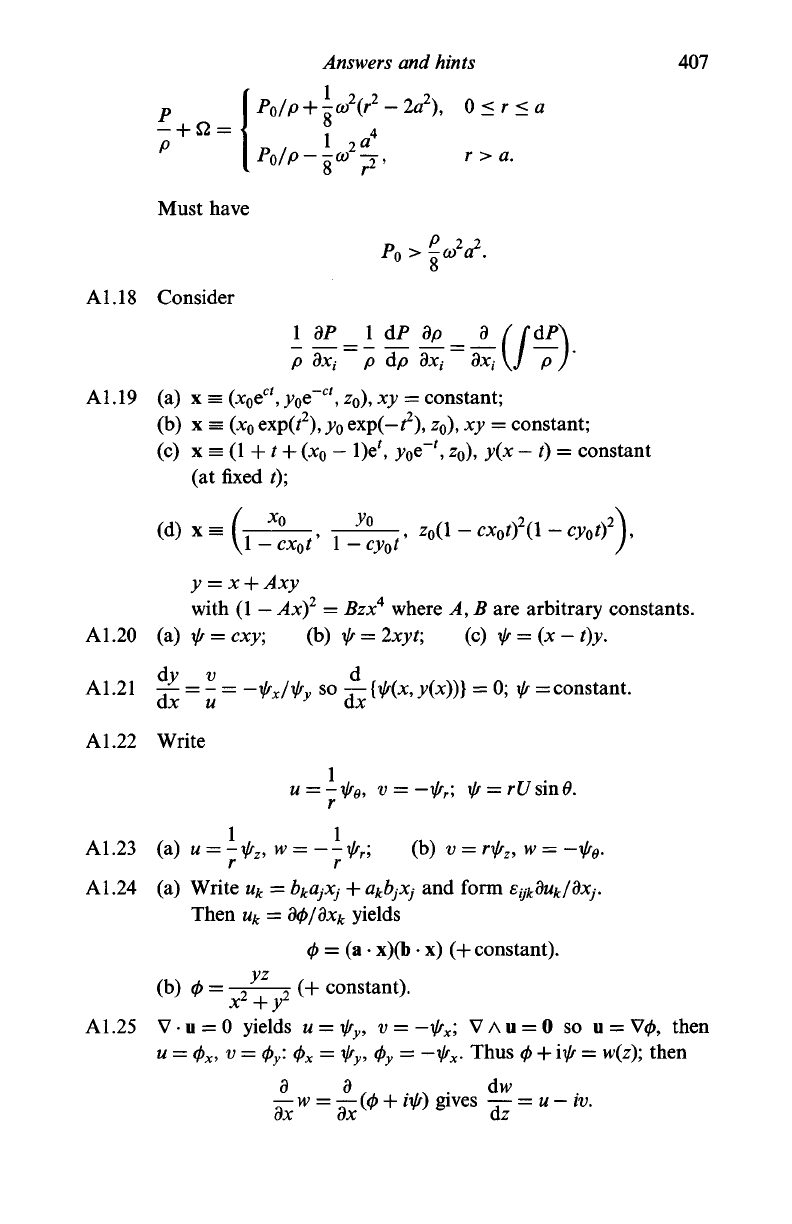
Answers and hints 407
-co
2
(r
2
-2a
2
),
0<r<a
8
Must have
A 1.18 Consider
1 3P_
1
dP
dp
_ d (
[dP\
p dx
{
~ p dp
dXi
~
dXi
\J p
)'
A1.19 (a) x = (x
o
e
c
\y
o
e
c
\ z
0
), xy
—
constant;
(b) x = (x
0
exp(^
2
), y
0
exp(-^), z
0
), xy = constant;
(c) x = (1 + f + (x
0
- l)e', yoQ~\ z
0
), >^(x - t) = constant
(at fixed t);
(d)
x EE
- cx
o
t 1 - cy
o
t
y =
with (1 - Ax)
2
= Bzx
4
where A, B are arbitrary constants.
A1.20 (a) V = c.xy; (b) f = 2xyt\ (c) ^ = (jc-Oj>-
dv v d
A1.21 — = - = —
TK/^V SO
— {iHx, y(x))} = 0;
i/r
= constant.
ax u
y
ax
A1.22 Write
1 _
r
'
r
'
A1.23 (a) u =
-ilf
z
,
w = —\1/' (b) v =
r\l/
z
,
w =
—\lr
e
.
r r
A1.24 (a) Write u
k
—
b
k
ajXj
H-
a
k
bjXj and form s
ijk
du
k
/dXj.
Then u
k
=
d</)/dx
k
yields
0 = (a
•
x)(b
•
x) (+ constant),
(b) 0 = ~2 j (+ constant).
A1.25 V-u = 0 yields u = i/r
y
, v = ~ir
x
\
VAU
= 0 SO
U
= V0, then
u
=
(p
x
,
v =
(j)
y
:
<\>
x
=
x/r
y
,
(f>
y
=
—\lr
x
. Thus
0 +
\yfr
= w(z);
then
d
d . dw
3x dx dz
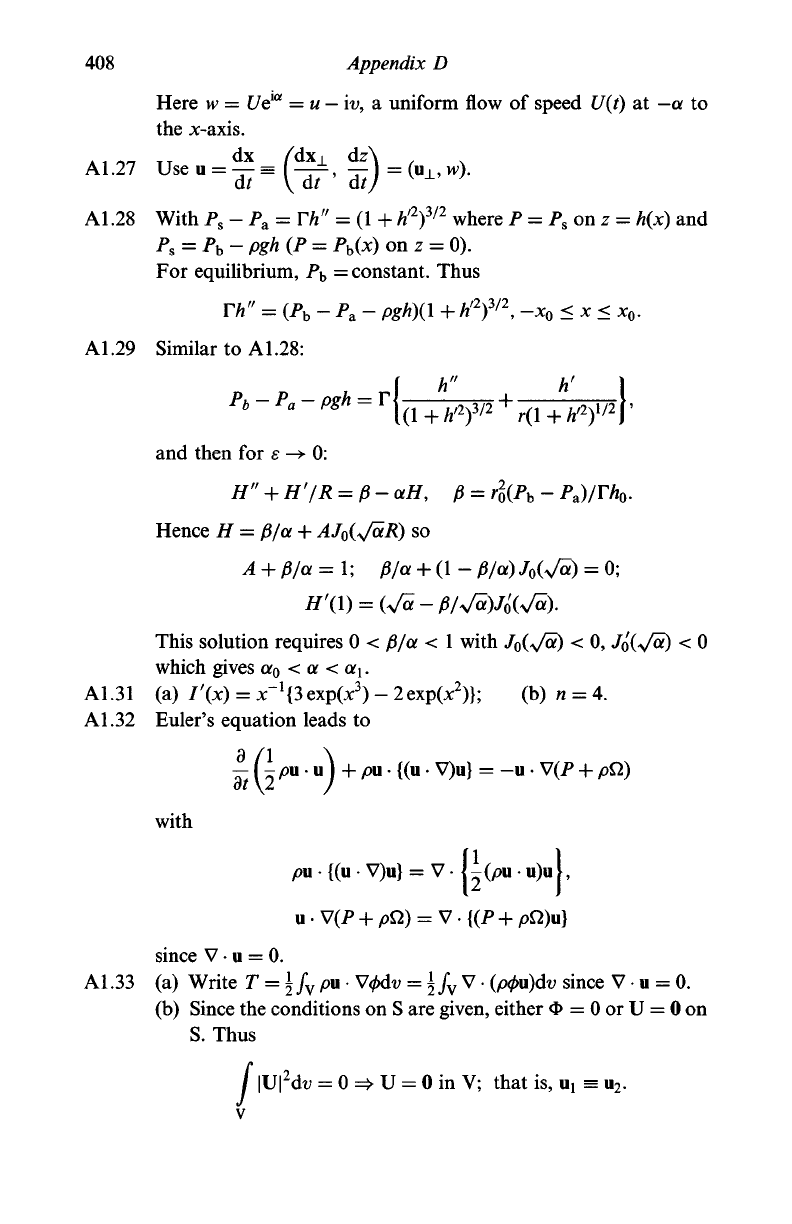
408 Appendix D
Here w = Ue
la
= u
—
iv, a uniform flow of speed U(t) at —a to
the jc-axis.
A
, ^ TT dx /dxi dz\
A1.27 Use u = -=(^,
-]=(«,,*).
A1.28 With />
s
- P
a
= rA" = (1 + A'
2
)
3/2
where i> = P
s
on z = /z(x) and
A = Pb ~ Pgh {P = P
h
(x) on z = 0).
For equilibrium, P
b
= constant. Thus
Th"
= (P
b
- />, - p^)(l + A'
2
)
3/2
, -x
0
< x < x
0
.
A1.29 Similar to Al.28:
and then for £ -> 0:
H" + //7i^ = 0-aH, 0 =
r
2
0
(P
h
-
Hence /f = p/a
4-
AJ
0
(JaR) so
^ + ^/a = 1;
p/ot
+
(1
- p/a)J
0
(y/a) = 0;
This solution requires 0 < p/ot < 1 with Jo(y/a) < 0, /o(V^) < 0
which gives a
0
< a < <*!.
A1.31 (a) I\x) = x"
1
{3 expO
3
) - 2exp(x
2
)}; (b) n = 4.
A1.32 Euler's equation leads to
\pn
•
u ) + pu
•
{(u
•
V)u} = -u
•
V(P + pQ)
with
pu
•
{(u
•
V)u} = V
•
|-(pu
•
u)u|,
u
•
V(P + pQ) = V
since V
•
u = 0.
Al.33 (a) Write T = \/
v
pu
•
V0dv = \ f
y
V
•
(p0u)dv since V
•
u = 0.
(b) Since the conditions on S are given, either 0 = 0 or U = 0 on
S. Thus
V\
2
dv
= 0 =* U = 0 in V; that is, u
{
= u
2
.
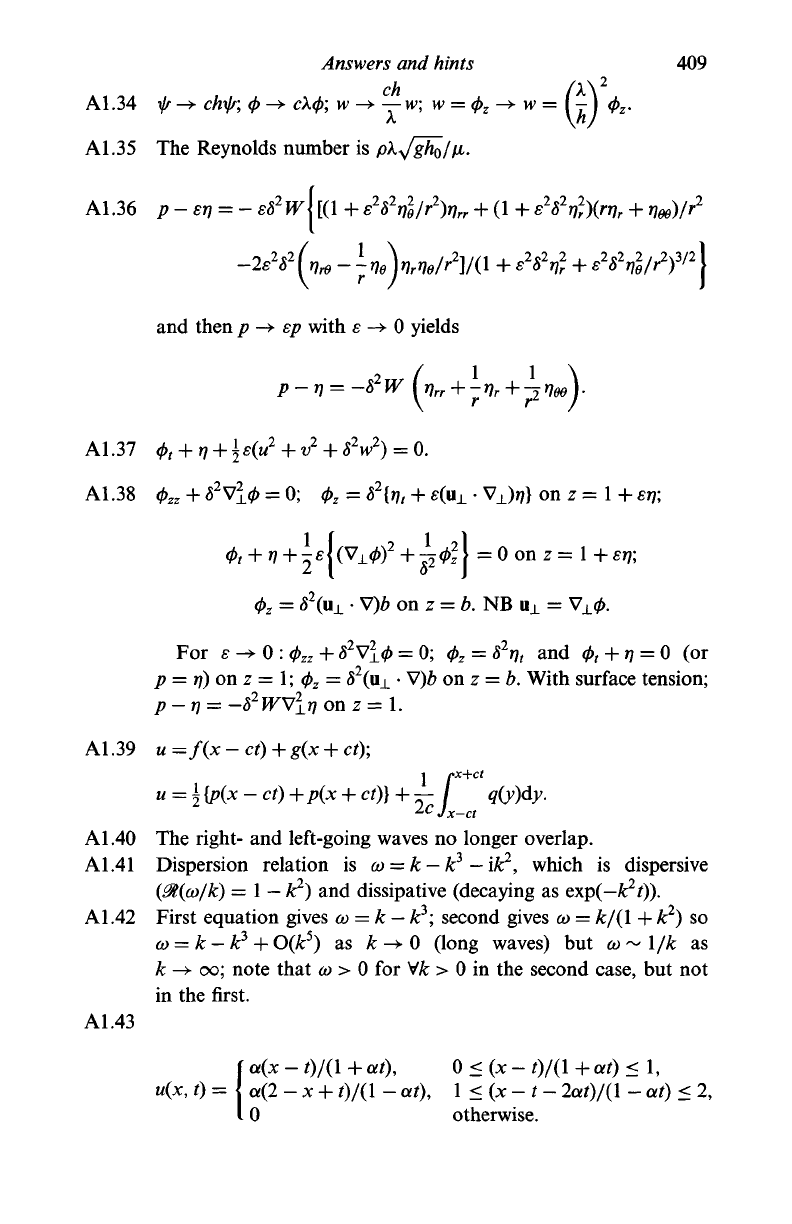
A1.34 ^ -> chfc
<t>
-^
cX4>\
w
-^ —w; w =
A1.35 The Reynolds number is
Answers and hints 409
p
(
A1.36
p-eri
= - e8
2
wl[(l + £
2
<5
2
^/r
2
)r/
rr
+ (1 +
e
2
8
2
r)
2
r
)(rri
r
e
2
8
2
rj
2
r
and then p -> ep with £ -* 0 yields
1 +
A1.37
</)
t
+
17
+ ^£(w
2
+ v
2
+ <$V) = 0.
A1.38
<t>
zz
+ 6
2
Vi0 = 0; 0
Z
=
8
2
{rj
t
+ e(u
±
•
VJT?}
on z = 1 +
srj;
nz = i. NB u
±
=
For s -> 0 : 0
ZZ
+ 5
2
vi^ = 0; 0
Z
= s\ and 0
r
4-17 = 0 (or
p =
rj)
on z
—
1; 0
Z
=
5
2
(u
±
•
V)6 on z = i. With surface tension;
p-T]
= -8
2
WV\r] on z = 1.
A1.39 u=f(x- ct) + g(x + ct);
u = \ {p{x - ct) +p(x + ct)} + — / q(y)dy.
A 1.40 The right- and left-going waves no longer overlap.
A1.41 Dispersion relation is
co
= k
—
k
3
—
ik
2
, which is dispersive
(@(co/k) = 1
—
k
2
) and dissipative (decaying as exp(—k?t)).
A1.42 First equation gives
co
= k
—
k
3
; second gives
co —
k/{\ 4- k
2
) so
co
= k —k
3
+ O(k
5
) as k -» 0 (long waves) but co~l/k as
k ->- 00; note that ^y > 0 for Vfc > 0 in the second case, but not
in the first.
A1.43
<a(x-
c,0=)a(2-:
lo
a(x - 0/(1 + at), 0 <
(JC
- 0/(1 + «0 < 1.
u(x, t) = \
a
(2 - x + 0/(1 - (*0. 1 < (^ -
*
~ 2at)/(l - at) < 2,
otherwise.
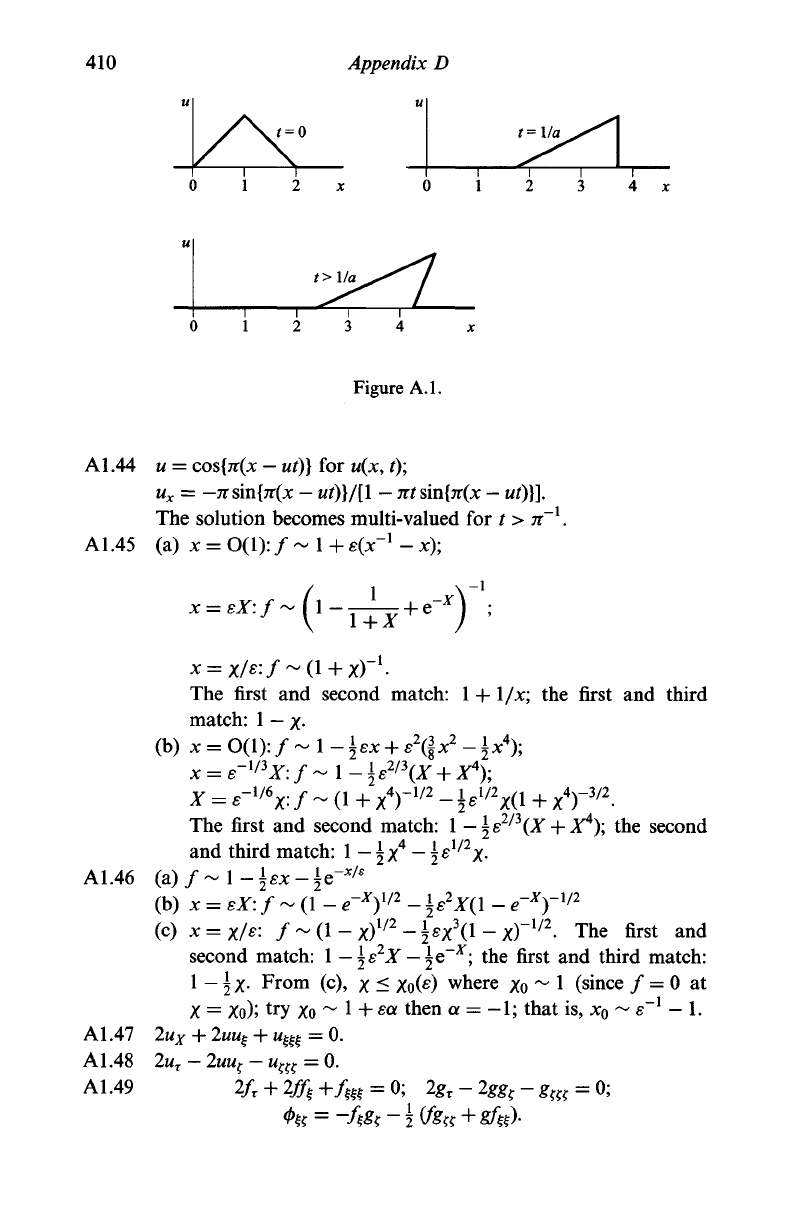
410
Appendix D
t>\la
Figure
A.I.
A1.44 u =
COS{TT(X
- ui)} for u(x, t);
u
x
=
—
7rsin{7r(;c
—
ut)}/[\
—
7Tf
sin{7r(x
—
ui)
The solution becomes multi-valued for t >
A1.46
A1.47
A1.48
A1.49
A1.45 (a) x =
O(l):
/ ~
1
+ s(x~
l
- x);
The first and second match:
1
+
1/JC;
the first and third
match:
1
—
x-
(b) x = O(l):/ ~
1
- \ex +
£
2
(§JC
2
- \x
4
)\
x
=
s~
l/3
X:
f~\-
\e
2/
\X
+ X
4
);
The
first
and
second
match:
1
—
^£
2/3
(X
+ X
4
); the
second
and
third
match:
1
—
\y£
—
^£
1/2
x-
(a)/~l-±£*-±e-*
/£
(b) x = eX:f~(l-
e~
x
)
l/2
-
\e
2
X{\
-
e~
x
)-
l/2
(c) x = x/e: / - (1 - x)
1/2
- ^X
3
(l -
x)"
1/2
.
The first and
second match:
1
—\S
2
X
—
\Q~
X
\ the first and third match:
\-\x-
From (c), x < Xo(^) where
Xo
~ 1 (since / = 0 at
X
= Xo); try xo ~
1
+ sa then a =
-1;
that is, x
0
- e~
l
- 1.
2M
Z
+
2uu%
+ M^ = 0.
2u
T
—
2uu
K
—
u
KKK
=
0.
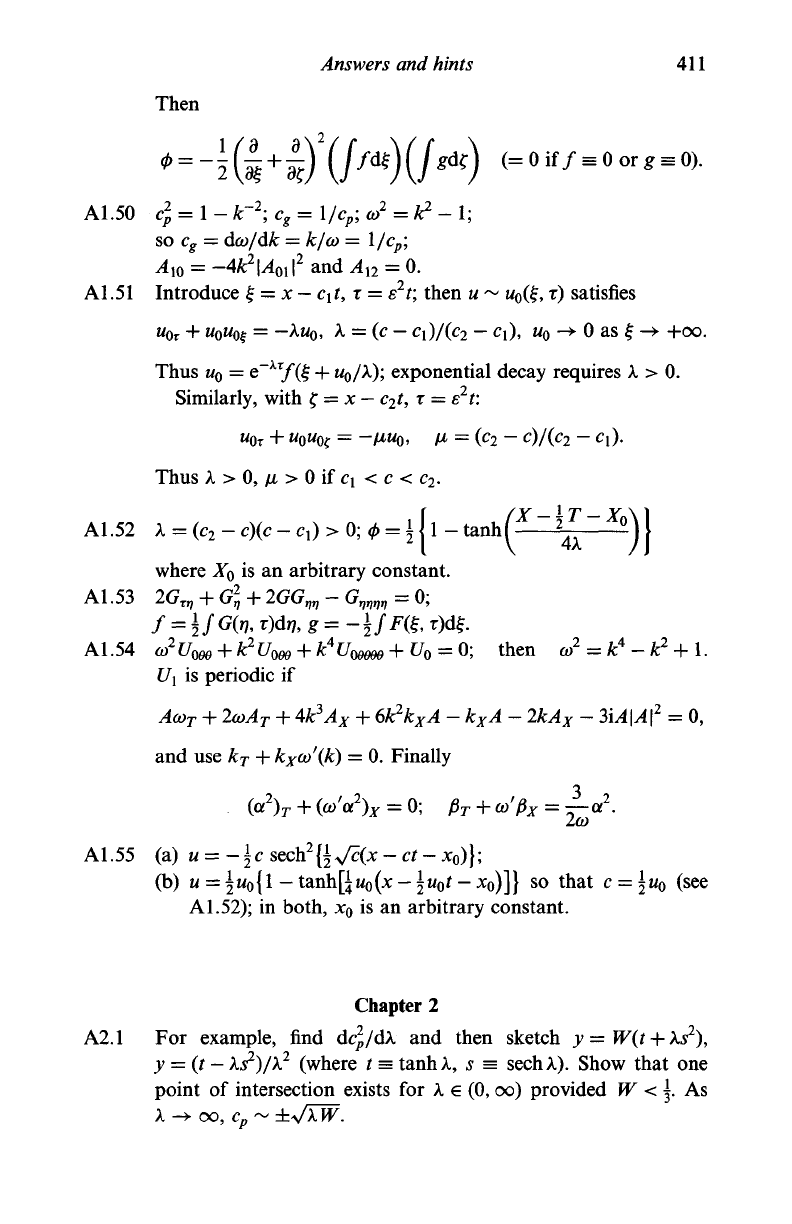
Answers
and
hints
411
Then
A1.50
4 = 1-
k~
2
;
c
g
= \/c
p
;
co
2
= k
2
- 1;
so
c
g
=
dco/dk
=
k/co
= l/c
p
;
22
A1.51 Introduce
£ = x
—
c
x
t, r = s
2
t;
then
u ~
w
o
(£>
T)
satisfies
"Or
+
wo
M
ot
=
~^
M
o»
A.
=
(c
-
ci)/(c
2
- q),
M
0
-> 0 as £ -•
+cx).
Thus
M
0
=
e~
Xr
f(t-
+
«o A)? exponential decay requires
A
> 0.
Similarly, with
f =
JC
- c
2
t, r = e
2
t:
u
Ot
+
w
o
%
=
-M«b.
M
=
(c
2
-
Thus
A
> 0, /x > 0 if
c
x
< c < c
2
.
;
0 =
i
jl
-
A1.52
k = (c
2
-
c)(c-c
x
) >
0
where A^
is an
arbitrary constant.
A1.53 20^,+
G*
+2GG,,,,-G^^O;
A1.54 o>
2
t/
0
^
+
fc
2
t/o^
+ fc
4
^^ +
t/o
=
0; then co
2
=k
4
-k
2
U\
is
periodic
if
Aco
T
+
2co^
r
+
4k
3
A
x
+
6A:
2
A:
Z
v4
- k
x
A -
2kA
x
-
3i^M|
2
= 0,
and use
k
T
•+•
k
X
(o'(k)
=
0. Finally
A1.55
(a)
u
= -\c
sech
2
{iv^(*
-
ct
- }
(b)
M
=
iw
o
{l -tenh[\u
o
(x-\u
o
t-x
o
)]}
so
that c
=
iw
0
(see
A1.52);
in
both,
JC
0
is an
arbitrary constant.
Chapter
2
A2.1
For
example, find dc
2
/dX
and
then sketch
y =
W(t
+ \s
2
),
y
=
{t
—
Xs
2
)/^
2
(where
t
= tanh
X,
s
== sechA). Show that
one
point
of
intersection exists
for
A
e
(0, oo) provided
W <\. As
A
->
oo, c^
V
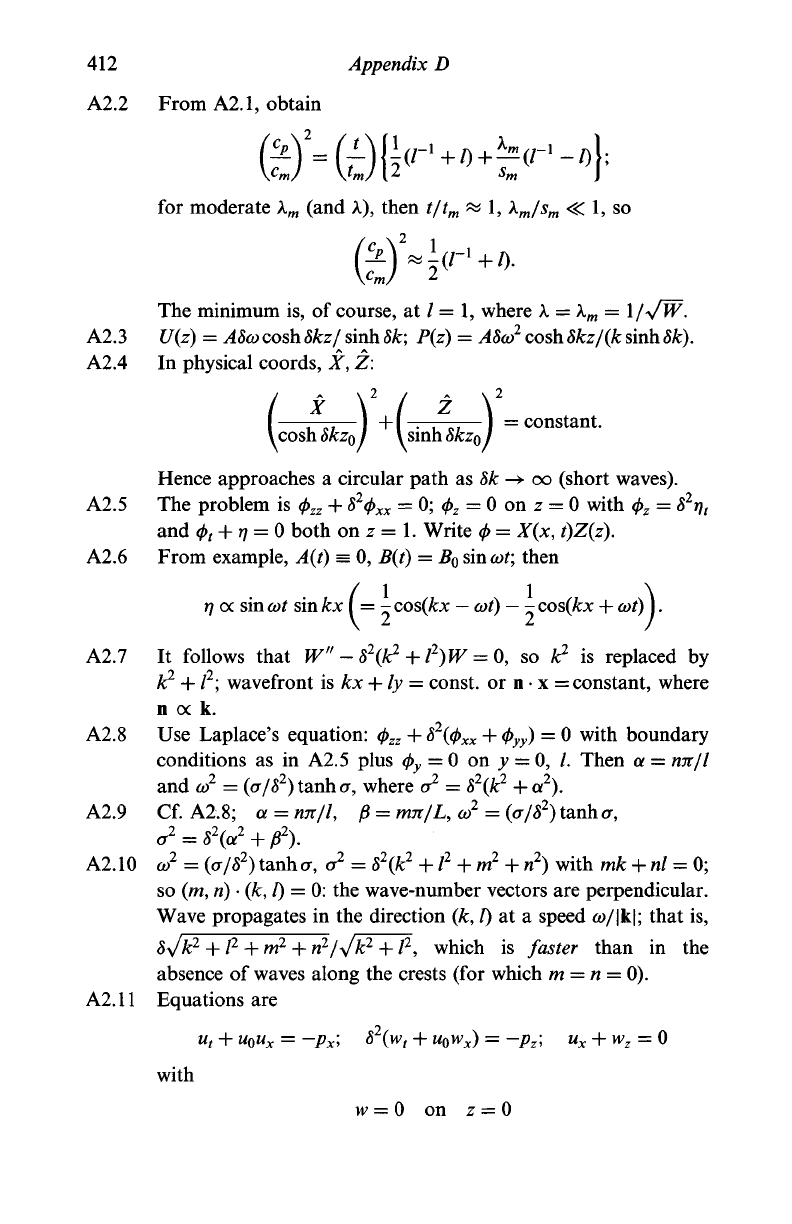
412 Appendix D
A2.2 From
A2.1,
obtain
for moderate k
m
(and X), then t/t
m
« 1,
A.
m
/j
m
«; 1, so
2
~-r
1
+
2
The minimum is, of course, at / = 1, where X = X
m
=
A2.3 U{z) =
A8co
cosh 8kz/ sinh
<$fc;
P{z) =
A8co
2
cosh 5fcz/(fc sinh 8k).
A2.4 In physical coords, X, Z:
2
/ z \
: constant.
Jf \ / Z \ _
cosh 8kz
0
I I sinh
5A:z
0
/
Hence approaches a circular path as 8k ->• oo (short waves).
A2.5 The problem is 0
ZZ
+
8
2
<j)
xx
- 0; 0
Z
= 0 on z = 0 with 0
2
= <$\
and
</>,
+
77
= 0 both on z = 1. Write
<\>
= X(x, t)Z(z).
A2.6 From example, A(t) = 0, B{i) = B
o
sin
cot;
then
77
a sin
cot
sin
A:x
I = - cos(fcx
— cot) —
- cos(kx + &tf)).
A2.7 It follows that W" -
8
2
(k
2
+ 1
2
)W = 0, so A:
2
is replaced by
A:
2
+ /
2
; wavefront is kx + ly = const, or n
•
x = constant, where
n a k.
A2.8 Use Laplace's equation: 0
ZZ
+
8
2
(<p
xx
+ 0^) = 0 with boundary
conditions as in A2.5 plus
(f>
y
= 0 on y = 0, /. Then a = mr//
and w
2
= (a/5
2
) tanh a, where a
2
= <5
2
(A;
2
+a
2
).
A2.9 Cf. A2-.8; a = nn/l, 0 = mn/L,
co
2
= {a/8
2
) tanh a,
o
2
=
8
2
{ci
2
+ p
2
).
A2.10 a? = {a/8
2
) tanh
or,
<r
2
=
8
2
{k
2
+ l
2
+m
2
+ n
2
) with mk + nl = 0;
so (m,«)
•
{k, I) = 0: the wave-number vectors are perpendicular.
Wave propagates in the direction {k, I) at a speed o>/|k|; that is,
8^/k
2
+ l
2
+ m
2
+
n
2
/y/k
2
+ /
2
, which is /aster than in the
absence of waves along the crests (for which m = n = 0).
A2.11 Equations are
u
t
+ u
o
u
x
= -p
x
\ 8
2
{w
t
+ u
o
w
x
) = -p
z
\ u
x
+ w
z
= 0
with
w = 0 on z
—
0
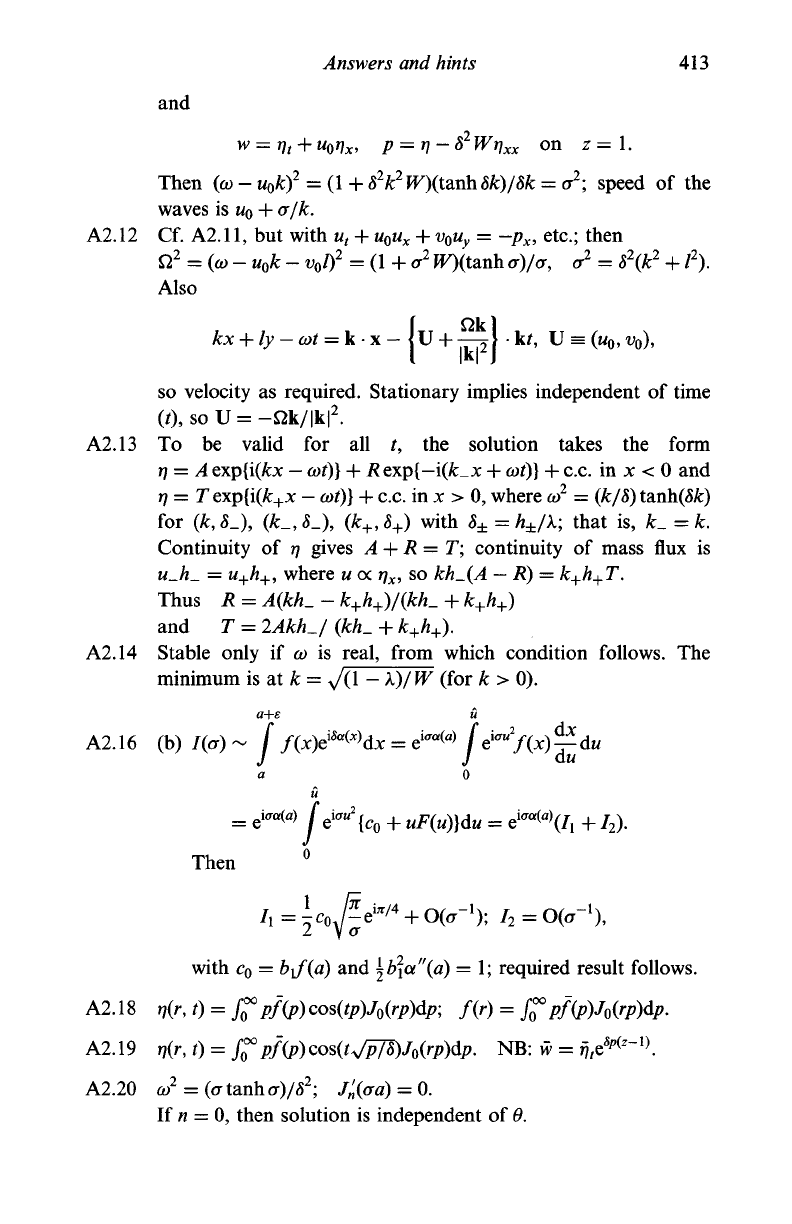
Answers and hints 413
and
w = rj
t
+ u
o
ri
x
, p = rj-8
2
Wrj
xx
on z = I.
Then
(co
- u
0
k)
2
= (1 + 8
2
k
2
W)(tanh8k)/8k = o
2
\ speed of the
waves is w
0
+ a/A:.
A2.12 Cf.
A2.11,
but with u
t
+
M
0
^
+ v
o
u
y
= —p
x
, etc.; then
Q
2
=
(co
- u
o
k -
v
0
t)
2
= (1 + a
2
tfO(tanh a)/a, a
2
=
8
2
(k
2
+1
2
).
Also
ly-cot = k-x- |u + —^i -kf, U = (w
0
, ^oX
so velocity as required. Stationary implies independent of time
(0,
so U = -ftk/|k|
2
.
A2.13 To be valid for all /, the solution takes the form
r]
= A exp{i(fcx
— cot)}
+ i?exp{—\(k_x +
cot)}
+ c.c. in x < 0 and
rj
= rexp{i(A:
+
Jc -
cot)}
+ c.c. in x > 0, where
co
2
= (k/8) tanh(<5fc)
for
(k,8_),
(k_J_\
(£+,«+) with
8
±
=h±/X\
that is, fc_ =k.
Continuity of r\ gives A + R=T\ continuity of mass flux is
u_h_ = u
+
h
+
, where u oc rj
x
, so kh_(A
—
R) =
k
+
h+T.
Thus R = A(kh_-k+h
+
)/(kh_+k
+
h+)
and r = 2y4A:A_/ (kh_ + A:
+
A
+
).
A2.14 Stable only if co is real, from which condition follows. The
minimum is at k = y/(l —X)/W (for
A:
> 0).
A2.16 (b) /(a) - f f(x)c
iSa(x)
dx = e
i(Ta(a)
/*e
W
/(x)^dw
0
ai?
{c
0
+ uF(u)}du = ^^(/i + /
2
).
Then °
with c
0
= b]f(a) and \b\cx"(a) = 1; required result follows.
A2.18
r
1
(r,t)
= f™pf(p)cos(tp)J
0
(rp)dp; f(r) =
f~pf(p)J
0
(rp)dp.
A2.19
r](r,t)
= f™pf(p)cos(t^/$)J
0
(rp)dp. NB: w = rjfi^
z
'
l
\
A2.20 a;
2
= (a tanh
<r)/<5
2
;
/
w
r
(a«) = 0.
If « = 0, then solution is independent of 6.
